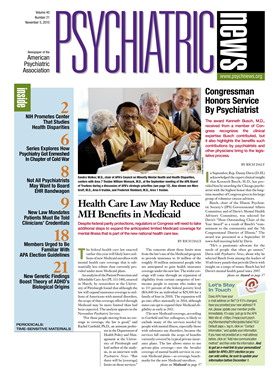Patients who stopped using antidepressant medication over one to seven days experienced a recurrence of mood disorder sooner than patients who were tapered off their medications over 14 days or more.
Moreover, the time to recurrence for those who rapidly discontinued antidepressants was one-fourth the estimated averageprevious interval between episodes of mood disorder in the same patients.
These findings appeared in the August American Journal of Psychiatry.
The difference in time to recurrence was observed for all disorders included in the study—major depressive disorder, bipolar II disorder, bipolar I disorder, and panic disorder—but was greatest for bipolar 1 and panic disorder.
The effect of the pace of discontinuation on time to recurrence was seen across antidepressant types.
The findings were derived from analysis of a large database of patients diagnosed and treated over the past three decades at a European mood-disorder center and included patients who were treated with tricyclic and tricyclic-like antidepressants or MAO inhibitors or newer antidepressants (selective serotonin reuptake inhibitors or bupropion, duloxetine, venlafaxine, or others).
In the study, Ross Baldessarini, M.D., and colleagues analyzed illness recurrence among 398 patients with a DSM-IV diagnosis of recurrent major depressive disorder, panic disorder, bipolar II disorder, or bipolar I disorder. All had been evaluated, treated, and followed at the Lucio Bini Mood Disorders Center affiliated with the University of Cagliari in Sardinia, Italy.
Baldessarini, a professor of psychiatry and neuroscience at Harvard Medical School, directs the psychopharmacology program in the McLean Division of Massachusetts General Hospital in Boston.
All subjects included in the analysis had recovered from a major depression or panic disorder based on clinical euthymia and a score of 7 or less on the Hamilton Rating Scale for Depression (HAM-D) sustained for at least 30 days. (The HAM-D scale was adapted for measuring recovery from panic disorder to ensure consistency.)
Patients discontinued medication for clinical or personal reasons over a known period, allowing categorization into groups based on rapid discontinuation (one to seven days) or gradual discontinuation (two weeks or more).
A total of 210 patients discontinued “gradually,” and 188 stopped medication within seven days (“rapidly”).
Baldessarini and colleagues found that those who discontinued rapidly had a median time to first new episode of depression or panic that was shorter by 4.8 months than those who gradually stopped medication, with little difference between the two major classes of antidepressants.
However, following gradual discontinuation, time to recurrence was five months longer after stopping tricyclics than after discontinuing newer types of antidepressants.
Stopping abr uptly or rapidly was almost always the patient's decision (94.1 percent of discontinuations), an observation that speaks to the importance of clinicians' educating their patients about the hazards of abrupt discontinuation without clinical supervision.
“Risk of later recurrence is markedly reduced by gradually reducing doses of many psychotropic drugs, ideally over at least several weeks, especially for agents that have been used for a long period,” lead author Baldessarini told Psychiatric News. “Close clinical observation and early intervention in the event of an impending relapse are wise components of comprehensive care.
Because rapid discontinuation is often a patient's decision, “many patients are either not aware of the risk or are skeptical that they may be affected, especially when they feel well after relatively long-term treatment. Most colleagues would agree that there is a duty to discuss risks of interrupting treatment, but such educational activities are often ineffective if done once, briefly, or in a routine manner and may require repetition at intervals during long-term treatment to encourage adherence.”
Two-thirds of the study sample were women, but the report did not include analysis of pregnancy as a factor in discontinuation of medication. Baldessarini told Psychiatric News that he believes many U.S. clinicians have traditionally been preoccupied with risk to fetal development linked to medication exposure.
“Gradually, there seems to be emerging a more balanced distribution of concern for both fetal risk and risks to pregnant women and the entire family if the mother becomes severely ill after stopping treatment,” he said. “Rates and timing of drug discontinuation for pregnancy are very complex matters that need to consider the intrinsic risks of the drug involved, its association with various adverse outcomes by time and rate of dose reduction or discontinuation, and the wishes of the patient, family, and physician.”
